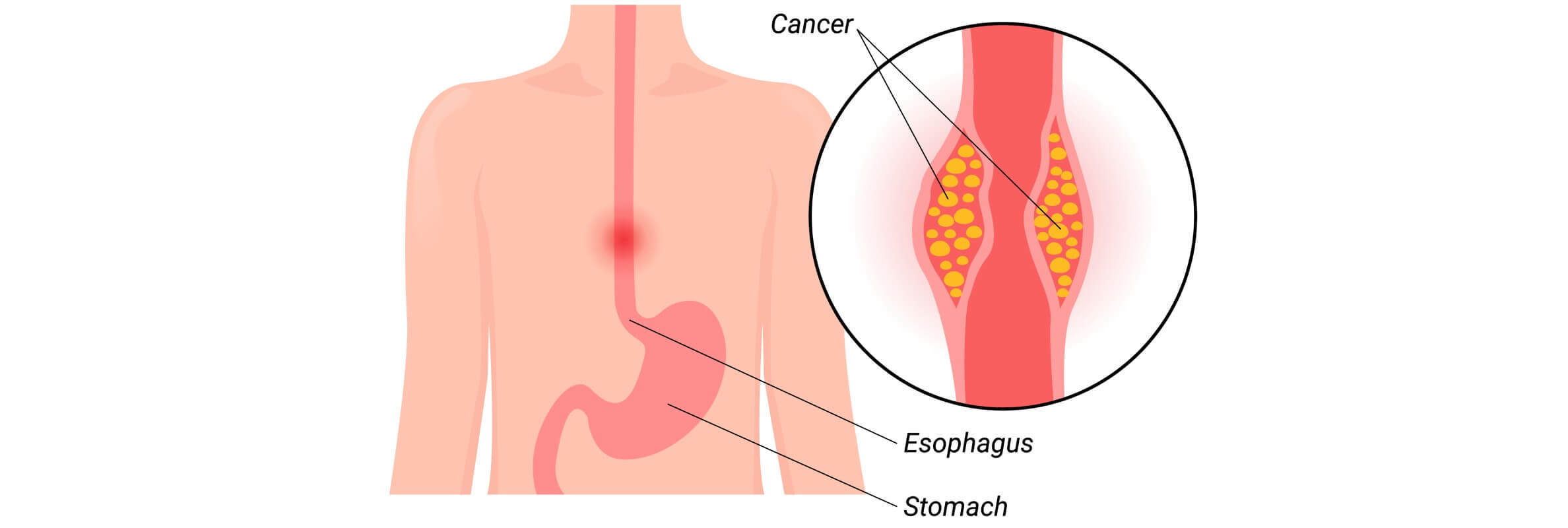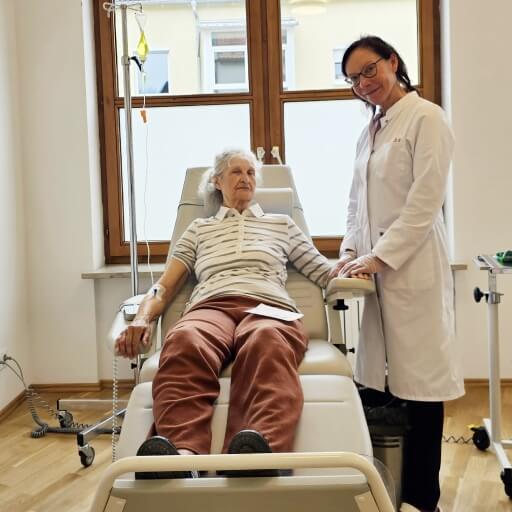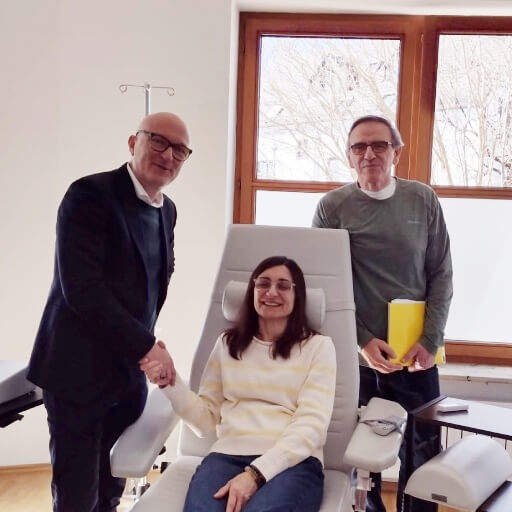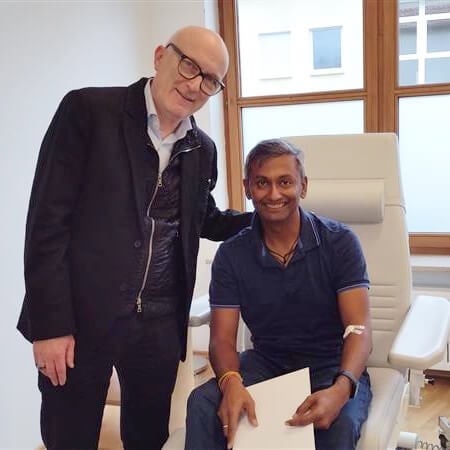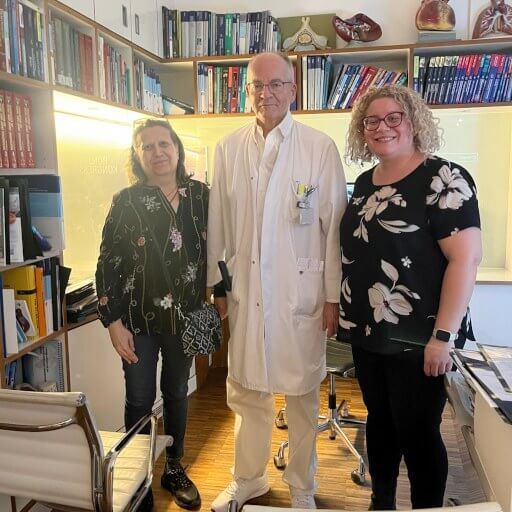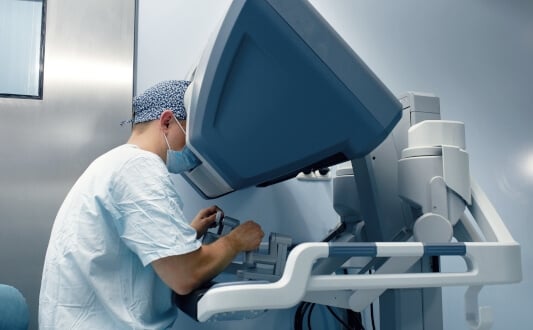Рак пищевода – сложная и агрессивная злокачественная опухоль. По данным исследований в области онкологии, это заболевание зачастую диагностируется поздно из-за его малозаметных симптомов на ранних стадиях: затрудненного глотания, боли в грудной клетке, потери веса и постоянного кашля.
К моменту достижения четвертой стадии опухоль распространяется за пределы пищевода на отдаленные органы, такие как печень, легкие, кости и лимфоузлы, что существенно усложняет куративное лечение. Прогноз при раке пищевода 4 стадии неутешительный: пятилетняя выживаемость составляет всего 5-20% в зависимости от общего состояния пациента, степени распространения онкопроцесса и ответа на лечение.
Пациенту с этим сложным диагнозом требуется квалифицированная медицинская помощь высочайшего стандарта. Наилучшие шансы на поздней стадии рака пищевода обеспечивает терапия по индивидуально разработанной схеме с учетом особенностей клинической ситуации пациента – во многих случаях такой подход способен повысить показатели выживаемости и улучшить качество жизни.
Стандартные протоколы лечения рака пищевода 4 стадии
При раке пищевода 4 стадии целью ставится не излечение заболевания, а замедление его прогрессирования, купирование симптомов и улучшение качества жизни пациента.
Химиотерапия обычно выступает в качестве главного метода системного лечения поздних стадий рака. Химиопрепараты действуют на раковые клетки по всему организму, в результате чего происходит уменьшение размеров опухоли и замедляется распространение онкопроцесса. Химиотерапия может назначаться в качестве самостоятельного метода лечения или в сочетании с другими видами терапии в зависимости от состояния пациента и целей конкретной схемы лечения.
Лучевая терапия часто используется именно в паллиативных, а не в лечебных целях. Она помогает уменьшить размер опухолей, провоцирующих обструкцию пищевода, за счет чего происходит облегчение затрудненного глотания. Облучение используется в качестве самостоятельного метода лечения или в сочетании с химиотерапией для обеспечения лучшего контроля над симптомами.
Хирургическое вмешательство на 4 стадии рака пищевода проводится редко, поскольку из-за распространения опухоли из первичного очага в отдаленные органы его выполнение считается нецелесообразным. В большинстве случаев риски операции и восстановления после нее перевешивают потенциальную пользу хирургического лечения на поздней стадии этого онкозаболевания.
Паллиативная помощь играет важную роль в лечении осложнений рака и поддержании по возможности удовлетворительного самочувствия пациента. При раке пищевода паллиативное лечение предполагает энтеральное питание, противоболевую терапию и установку пищеводных стентов для обеспечения возможности самостоятельного приема пищи. Эти процедуры выполняются многопрофильной командой врачей, в которую зачастую входит и гастроэнтеролог, с целью улучшения самочувствия пациента и поддержания его нормальной жизнедеятельности.
Инновационные виды лечения
С развитием направления онкологии в арсенале врачей появились инновационные виды терапии, способные помочь пациентам с раком пищевода 4 стадии. Такие традиционные методы лечения, как химиотерапия и облучение, направлены лишь на облегчение симптомов, в то время как новаторские терапевтические подходы помогают бороться с раком на молекулярном уровне, что потенциально улучшает показатели выживаемости и качество жизни пациента.
Интервенционная радиология
В области интервенционной радиологии пациентам предлагаются минимально инвазивные лечебные процедуры, приобретающие все более важное значение в контексте комплексного лечения рака пищевода. Подобные интервенционные вмешательства выполняются под визуальным контролем. Они обеспечивают таргетное лечение рака пациентам с ограниченными возможностями терапии по стандартному протоколу, в том числе пациентам с рецидивом онкопатологии, противопоказаниями к хирургическому вмешательству и метастатическим раком на поздней стадии.
Интервенционные техники дают возможность воздействовать непосредственно на опухолевый очаг при минимальном повреждении здоровых тканей, за счет чего врачам удается одновременно добиться облегчения симптомов и контроля над заболеванием. Эти процедуры используются в качестве основного лечения на ранних стадиях онкозаболевания, дополнительной терапии наряду с традиционными методами лечения или паллиативной терапии на поздних стадиях рака, когда первостепенной задачей является поддержание удовлетворительного качества жизни.
Термоабляция – один из наиболее широко применяемых методов абляции, предполагающий использование тепловой энергии для стимуляции необратимого повреждения раковых клеток. Изначально термоабляция применялась лишь в рамках протоколов лечения рака печени и легких, но в настоящее время проводятся исследования по возможности интеграции метода в терапевтическую схему при раке пищевода. Данная лечебная процедура продемонстрировала особую эффективность при локальном рецидиве рака пищевода и при невозможности выполнения хирургического вмешательства.
Последние результаты многоцентровых исследований свидетельствуют о том, что проведение термоабляции в сочетании с химиотерапией в около 74% случаев способствует улучшению локального контроля заболевания при 12-месячном наблюдении, что особенно важно для пациентов с ранними стадиями рака и остаточными интрамуральными опухолями. Термоабляция рассматривается в качестве перспективного дополнительного метода лечения в контексте стандартного протокола или же в случаях рецидива заболевания после эзофагэктомии.
Криоабляция – основу этого метода лечения составляет применение экстремального холода, стимулирующего апоптоз клеток. Процедура продемонстрировала эффективность в лечении плоскоклеточного рака пищевода (ПКРП) на ранних стадиях и синдрома Барретта, благодаря чему получила распространение в лечении рака пищевода. Следовательно, криоабляция является важным вариантом лечения для пациентов с противопоказаниями к эзофагэктомии.
Согласно результатам клинических исследований, более чем в 80% случаев после проведения криоабляции у пациентов наблюдалось значительное облегчение симптомов и восстановление слизистой оболочки пищевода, при этом процедура продемонстрировала благоприятный профиль безопасности и низкую частоту серьезных осложнений. Криоабляция позволяет проводить лечение без травмирования близлежащих тканей, благодаря чему есть возможность повторного проведения лечебной манипуляции или ее выполнения в области жизненно важных анатомических структур.
Электрохимиотерапия (ЭХТ) – метод лечения, сочетающий локальное введение химиотерапевтических препаратов с одномоментным воздействием на опухолевую ткань электрическим током для улучшения усвоения лекарственных средств и стимуляции апоптоза раковых клеток. ЭХТ чаще всего используется при поражении кожи и мягких тканей, но недавние исследования доказали ее эффективность при прогрессирующем раке пищевода. ЭХТ демонстрирует особенно обнадеживающие результаты при онкопроцессе с поражением грудной стенки.
По предварительным данным, в отдельных клинических случаях частота ответа опухоли на лечение методом электрохимиотерапии составляет около 72%, особенно при использовании ЭХТ в паллиативных целях или после безуспешного системного лечения. К тому же ЭХТ способствует усилению иммунного ответа, поэтому применение этого метода в комплексе с иммунотерапией на поздних стадиях рака пищевода обеспечивает лучший результат.
Стоимость электрохимиотерапии при раке пищевода 4 стадии в специализированных немецких центрах обычно составляет от 7500 до 12000 евро – в зависимости от сложности случая и количества сеансов. В стоимость электрохимиотерапии входит использование современных методов визуализации и специализированного оборудования, анестезия и медицинское наблюдение на протяжении процедуры и после нее.
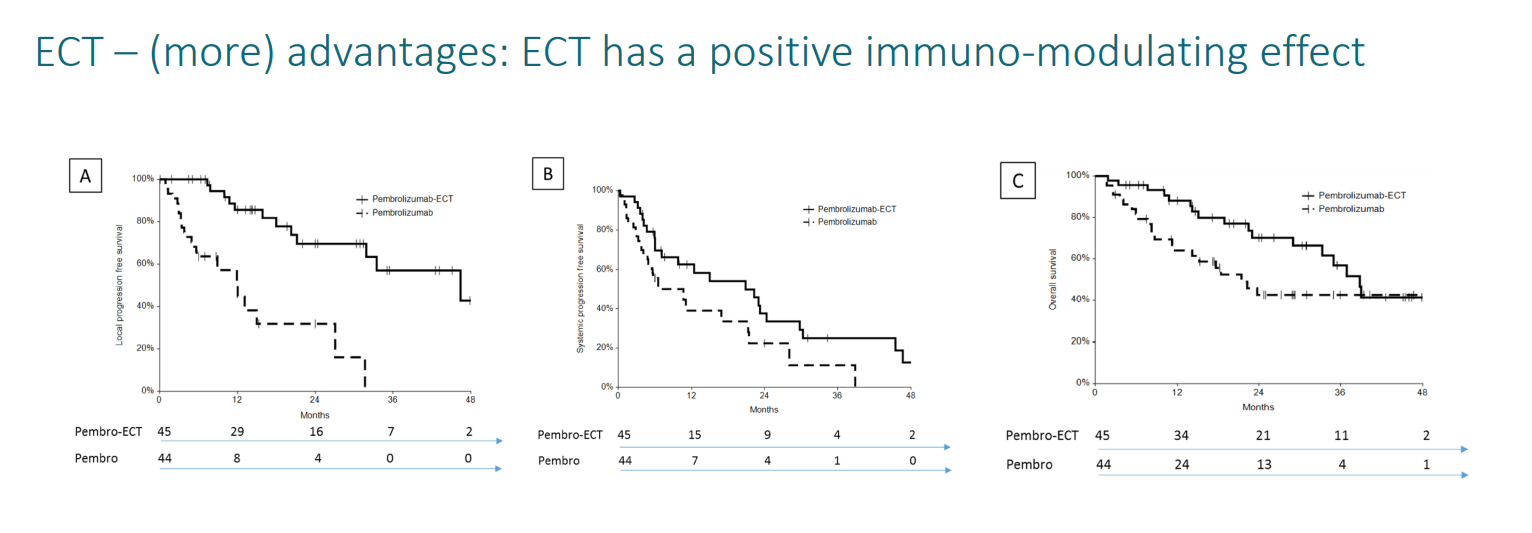
Химиоэмболизация (TACE)
Трансартериальная химиоэмболизация (TACE) – передовой метод локализованного лечения, при котором химиопрепараты доставляются непосредственно к опухолевому очагу с одномоментной блокировкой кровоснабжения новообразования. В результате проведения данной лечебной процедуры злокачественная опухоль лишается питательных веществ и усиливается локальное действие химиопрепаратов.
В отличие от системной химиотерапии, TACE воздействует лишь на онкологический очаг, благодаря чему обеспечивается минимальный профиль побочных эффектов. Таким образом, TACE расценивается в качестве особенно эффективного метода лечения метастазов в печени, часто встречающихся при раке пищевода 4 стадии. По данным клинических исследований, TACE способствует улучшению локального контроля над опухолью и повышению качества жизни, а в некоторых случаях эта процедура позволяет существенно продлить жизнь пациента по сравнению с лечением по схеме с использованием лишь традиционной химиотерапии.
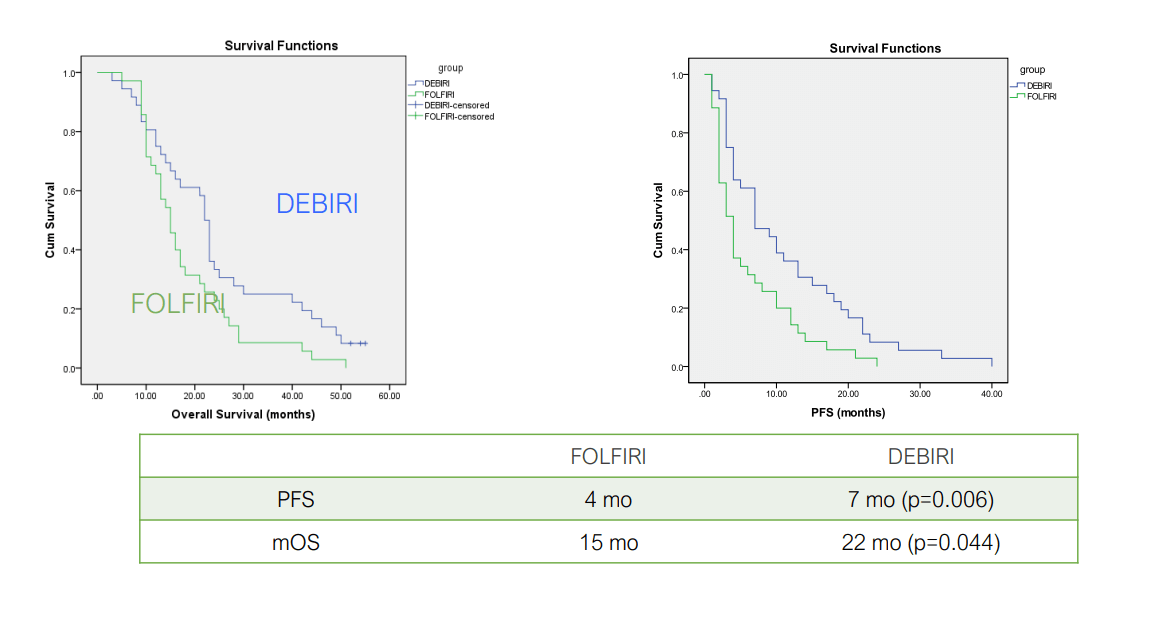
Aliberti C et al Ancancer Res 2011;31:4581
Richardson A et al J Vasc Interv Radiol 2013;24:1209
**DEBIRI = TACE, FOLFIRI = IV therapy
Регионарная химиотерапия при метастатическом раке пищевода
Регионарная химиотерапия в Германии меняет подход к химиотерапии при раке пищевода 4 стадии. РХТ предполагает доставку высокой дозы лекарственного вещества непосредственно к метастатическим очагам вместо его «разбавления» в общем объеме крови. Врачи изолируют определенные анатомические области с помощью баллонных катетеров, создавая замкнутые контуры, где дозы химиопрепаратов достигают уровней в 15-20 раз выше, чем при системном введении.
При раке пищевода с распространением на медиастинальные лимфоузлы, легкие или печень специалисты применяют изолированную перфузию грудной клетки или перфузию верхних отделов брюшной полости – в зависимости от характера метастазирования. При этом кровь в изолированной области активно насыщается химиопрепаратом, а после завершения процедуры врачи удаляют его остатки с помощью фильтрации – полностью устраняя системную токсичность.
Клинические данные из немецких центров демонстрируют значимые результаты у пациентов, исчерпавших традиционные возможности лечения: частота ответа на лечение – 68% (сочетание частичного ответа и стабилизации заболевания) с медианой выживаемости в 38 месяцев с момента постановки диагноза [8]. Циклы лечения длятся дни, а не недели, и пациенты легко его переносят. Для заболевания 4 стадии, когда стандартная терапия оказалась неэффективной, регионарная химиотерапия предлагает контроль над болезнью, которого системные подходы обеспечить не могут. Больше информации вы найдете в интервью с профессором Айгнером, разработчиком этих методик.
Терапия дендритными клетками
Терапия дендритными клетками – инновационный вид иммунотерапии, у истоков которой стоит научно-исследовательская деятельность, отмеченная Нобелевской премией. Суть метода состоит в усилении иммунного ответа пациента для борьбы с раком. Данная прогрессивная лечебная процедура подразумевает забор у пациента дендритных клеток, их модификацию в лабораторных условиях с целью лучшего распознавания раковых антигенов и их повторное введение в организм пациента для стимуляции иммунной системы к атаке на опухоль.
Терапия дендритными клетками продемонстрировала многообещающие результаты при раке пищевода 4 стадии: она способствует снижению опухолевой нагрузки, усилению иммунного ответа и замедлению прогрессирования заболевания, особенно при ее проведении в комбинации с такими традиционными методами лечения, как химиотерапия или таргетная терапия.
Представляем вашему вниманию интервью с профессором Франком Гансауге – ведущим экспертом в области иммунотерапии с более чем 22-летним опытом. В своем интервью специалист рассказывает об особенностях проведения терапии дендритными клетками, ее способности стимулировать собственную иммунную систему пациента для уничтожения раковых клеток, высокой эффективности данного метода и причинах его признания в качестве особенно перспективного вида терапии в контексте лечения прогрессирующего рака.
Профессор Ганcауге раскрывает секреты лечения рака дендритными клетками: от науки к практике
Гипертермия
Гипертермия представляет собой новаторский метод лечения рака, в основе которого лежит контролируемое воздействие высокими температурами на все тело пациента или его отдельные участки с целью ослабления раковых клеток. Гипертермия помогает повысить чувствительность раковых клеток к стандартным методам лечения, таким как химиотерапия и облучение. Проведение данной лечебной манипуляции предполагает повышение температуры опухолевых тканей примерно до 41-43°C, на фоне чего происходит разрушение структуры раковых клеток и снижается их способность к восстановлению повреждений ДНК, что в свою очередь способствует повышению эффективности традиционных методов лечения.
При раке пищевода 4 стадии, при котором зачастую происходит распространение метастазов в печень, легкие или кости, гипертермия расценивается в качестве эффективного метода поддерживающей терапии. В таком случае эта процедура способна потенциально улучшить результаты лечения, особенно у пациентов, которым противопоказана агрессивная химиотерапия или лучевая терапия из-за других проблем со здоровьем. Как локальная гипертермия, так и гипертермия всего тела способствует лучшей регрессии опухоли, облегчению болевого синдрома и даже повышению показателей выживаемости при условии интеграции процедуры в комплексную схему лечения. На данный момент этот метод все еще находится на стадии изучения, но уже сейчас можно смело говорить о его большом потенциале в качестве вспомогательного вида терапии при четвертой стадии рака пищевода и улучшении результатов лечения прогрессирующего рака.
Сравнительная таблица с данными по стандартным и инновационным методам лечения
При выборе методов лечения рака пищевода 4 стадии необходимо сравнить их эффективность, показатели выживаемости и стоимость терапии. В этом поможет представленная ниже сравнительная таблица, составленная на основании результатов последних исследований и научных данных.
| Характеристики/Вид терапии | Показатели 2-летней выживаемости | Показатели ответа на лечение | Продолжительность курса лечения | Побочные эффекты |
|---|---|---|---|---|
| Стандартные методы лечения | ~25% на поздних стадиях рака | Менее 10% | Несколько циклов | Тяжелые побочные эффекты (тошнота, утомляемость, выпадение волос, иммуносупрессия, раздражение кожи) |
| Инновационные методы лечения | ~60% на поздних стадиях рака | 45-65% | До 4 сеансов | Незначительные побочные эффекты (дискомфорт в месте проведения лечебной манипуляции) |
Стоимость лечения рака пищевода 4 стадии
| Метод лечения | Германия | Великобритания | США |
|---|---|---|---|
| Стандартные методы лечения | €80 000 - €150 000 за полный курс | €90 000 - €165 000 за полный курс | €100 000 - €180 000 за полный курс |
| Инновационные методы лечения | €25 000 - €60 000 за полный курс | €70 000 - €120 000 за полный курс | €100 000 - €150 000 за полный курс |
* В таблице указана приблизительная стоимость лечения стандартными и инновационными методиками. Цены могут значительно отличаться в зависимости от страны и клиники, в которых будет проходить лечение, продолжительности курса лечения, количества сеансов терапии и индивидуальных потребностей пациента.
Истории пациентов об успешном лечении
Диагноз рак пищевода 4 стадии зачастую воспринимается больным как приговор. К счастью, все не так безнадежно, как может показаться, ведь современная онкология предлагает множество вариантов лечения, способных продлить пациенту жизнь и улучшить ее качество, а в некоторых случаях врачам даже удается добиться длительной ремиссии. Благодаря внедрению в клиническую практику таких инновационных методов лечения, как терапия дендритными клетками, иммунотерапия и таргетная терапия, у пациентов сейчас есть гораздо больше возможностей, чем когда-либо прежде.
Многим пациентам с изначально неблагоприятным прогнозом удалось существенно улучшить свое состояние благодаря лечению по индивидуальной схеме, разработанной с учетом особенностей их конкретной клинической ситуации: у некоторых из них отмечается уменьшение размеров опухоли, другим же удалось добиться стабилизации заболевания с меньшим количеством побочных эффектов по сравнению с традиционной химиотерапией. Часто бывает так, что пациенты, которые обращаются к врачам с целью получения «второго мнения» или решаются пройти лечение в рамках клинических испытаний, узнают о ранее неизвестных им возможностях терапии.
Одной из таких пациенток является Хармохан Каур, у которой диагностировали рак пищевода 4 стадии. Она проходила лечение в Онкологической клинике LDG Laboratories в Берге, под личным кураторством доктора Гансауге. Пациента осталась довольна лечением, которое прошло максимально просто. Она особо отметила важную роль индивидуального подхода к терапии и превосходного медицинского оборудования в клинике, которые внушили ей уверенность в высочайшем качестве предоставленной медицинской помощи. Личный опыт пациентки Хармохан Каур является важным свидетельством решающей роли профессиональных консультаций и принятия обоснованных решений касательно лечения рака пищевода 4 стадии. Не существует ни одного метода, который мог бы гарантировать излечение онкопатологии на последней стадии, но с появлением новых видов терапии у многих пациентов появилась надежда.
Эффективное лечение рака: опыт пациентов Booking Health
Поездка на лечение за границу с Booking Health
Самостоятельный поиск наилучшей тактики лечения с учетом вашей индивидуальной клинической ситуации – довольно сложная задача. Испытав на себе многочисленные курсы лечения, проконсультировавшись со множеством специалистов и испробовав различные терапевтические процедуры, вам может быть трудно сориентироваться во всей предоставленной врачами информации. В таком случае пациенты зачастую выбирают первый же предложенный вариант лечения или соглашаются на лечение с применением стандартизированных терапевтических протоколов, которое повлечет за собой множество побочных эффектов, вместо того, чтобы рассмотреть возможность терапии с помощью инновационных процедур.
Если вы хотите сделать осознанный выбор и получить лечение рака в соответствии с индивидуально разработанной для вас схемой с учетом особенностей вашей конкретной клинической ситуации, проконсультируйтесь с врачами-консультантами Booking Health. Компания Booking Health уже более 12 лет занимает ведущие позиции в сфере организации лечения за рубежом с применением новейших инноваций в медицине, поэтому ее специалисты обладают огромным опытом в составлении персонализированных комплексных программ лечения для каждого пациента. Booking Health пользуется репутацией авторитетной компании, которая предоставляет персонализированный подбор схемы лечения рака пищевода 4 стадии и клиники с прямым бронированием приема в медицинском центре и полной поддержкой на каждом этапе лечения – от решения организационных вопросов до помощи в процессе лечения. Мы предлагаем:
- Оценку и анализ выписок пациента
- Составление индивидуальной программы лечения
- Подбор подходящего медицинского учреждения для лечения
- Подготовку медицинской документации и ее направление в выбранную пациентом для лечения клинику
- Консультации с врачами зарубежной клиники для разработки оптимальной медицинской программы на этапе подготовки к поездке на лечение
- Экспертные консультации во время пребывания в больнице
- Последующее консультирование пациента после его возвращения на родину по завершении медицинской программы
- Решение организационных вопросов в рамках подготовки к поездке на лечение за границу
- Координацию пребывания пациента в другой стране, помощь в бронировании отеля или апартаментов на период лечения
- Помощь в оформлении визы и бронировании авиабилетов
- Услуги переводчика и персонального координатора, который будет с вами на связи 24/7
- Прозрачные цены на лечение без скрытых платежей
Здоровье – главная ценность в жизни каждого человека, доверять заботу о которой стоит лишь лучшим специалистам с богатым опытом и проверенной репутацией. Booking Health – это ваш надежный партнер, который оказывает всестороннюю помощь на пути к восстановлению здоровья и улучшению качества жизни. Свяжитесь с врачом-консультантом компании, чтобы узнать больше о возможностях персонализированного лечения метастатического рака пищевода у ведущих экспертов с использованием инновационных методов.
Частые вопросы наших пациентов о раке пищевода 4 стадии
Отправить запрос на лечениеРак пищевода 4 стадии – наиболее тяжелая стадия заболевания, при которой происходит распространение опухоли за пределы пищевода в отдаленные органы: печень, легкие, кости и лимфоузлы.
Как правило, на этой стадии прогноз неблагоприятный – 5-летняя выживаемость составляет всего около 5-20% в зависимости от проводимых методов лечения и общего состояния пациента.
В настоящее время рак пищевода 4 стадии относится к числу неизлечимых заболеваний, но существуют методы лечения, которые могут продлить больному жизнь и улучшить ее качество.
Если пациент не получает лечение, продолжительность жизни обычно составляет 3-12 месяцев, но в некоторых случаях инновационные методы лечения помогают повысить показатели выживаемости до нескольких лет.
Применение индивидуального подхода к лечению и передовых видов терапии в определенных случаях позволяет перевести болезнь в хроническую форму, что обеспечивает лучшие показатели выживаемости.
К распространенным симптомам рака пищевода 4 стадии относятся дисфагия (затрудненное глотание), непреднамеренная потеря веса, боль в грудной клетке, постоянный кашель и осиплость голоса.
Стандартные методы лечения включают химиотерапию, лучевую терапию и паллиативную помощь. К числу инновационных вариантов лечения относятся гипертермия, вакцинация дендритными клетками, таргетная терапия и TACE (химиоэмболизация).
Полная ремиссия при раке пищевода 4 стадии встречается довольно редко, но при проведении лечения с использованием современных видов иммунотерапии и таргетной терапии у некоторых пациентов наблюдается частичная ремиссия или долгосрочная стабилизация заболевания.
На 4 стадии рака пищевода метастазы проникают в отдаленные органы, из-за чего излечение считается маловероятным, в то время как на ранних стадиях онкопроцесс более локализован, часто возможно проведение хирургического вмешательства и лучевой терапии.
Выбирайте лечение за рубежом и Вы, несомненно, получите отличный результат!
Авторы:
Статья составлена под редакцией экспертов в области медицины, врачей-специалистов доктора Надежды Иванисовой и доктора Вадима Жилюка. Для лечения состояний, о которых идет речь в статье, необходимо обратиться к врачу; информация в статье не предназначена для самолечения!
С редакционной политикой, которая отражает наше стремление к точности и прозрачности, можно ознакомиться здесь. Перейдите по ссылке, чтобы ознакомиться с нашими правилами.
Источники:
World Journal of Surgical Oncology
International Journal of Molecular Sciences
[8] Vashist Y, Aigner K, Dam M, Gailhofer S, Aigner KR. Regional Chemotherapy Is a Valuable Second-Line Approach in Metastatic Esophageal Cancer after Failure to First-Line Palliative Treatment. Curr Oncol. 2022;29(7):4868-4878. https://doi.org/10.3390/curroncol29070386 [DOI]
Читайте:
Рак пищевода. Лечение в Германии
Роботизированное лечение патологий пищевода: система Da Vinci
Альтернативные методики лечения онкологических заболеваний в Германии
Меню статьи:
Не знаете, с чего начать?
Свяжитесь с Booking Health